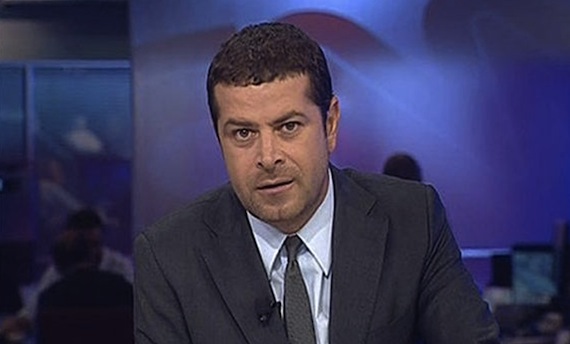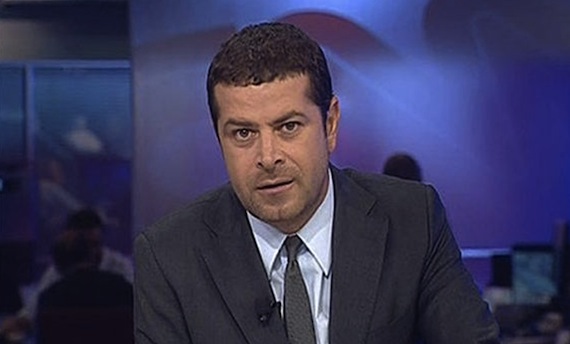Cüneyt Özdemir | (Duke University Middle East Studies Center | – –
Cüneyt Özdemir is a columnist and investigative journalist with 28 years experience reporting from Turkey and the Middle East. An icon of Turkish media, he is host of the weekly current events program 5N1K, the author of thirteen books on politics and popular culture and is currently preparing to release a documentary on the coup attempt of July 2016 entitled Defiance: The Night of the Failed Coup.
I have been practicing journalism actively for 28 years in Turkey. During that period I‘ve covered almost all of the major events in the region, not only Turkish politics or popular culture, but also international conflicts and wars in the Middle East. Over the last decade I’ve witnessed the ruling AKP marginalize fact-based media so that today 85% of the mainstream media in Turkey answers directly to the party in power. For the past 10 months, I have been working from New York, although I still travel to Istanbul quite frequently.
The dire situation of the media has only gotten worse since the failed coup of July 15, 2016, which has proven to be a transformative night in Turkish history. That night, a group of Turkish soldiers attempted a putsch or coup. They failed. For many Turks as well as international audiences this came as great surprise. How could Turkey, a member of NATO and the G20, an EU candidate country and a society that aspires to the values of the modern world, still be the fertile ground for a military coup? Some said it was fake. It was real, and by all accounts, well planned. A decision to initiate the coup four hours earlier than planned due to an intelligence leak may have led to its failure.
That night, subsequent to President Erdoğan’s call to action through FaceTime, millions poured into the streets. It was astonishing. There’s still a shroud of mystery around what happened in the military chain of command over 12 fateful hours when 241 died and 2,194 were wounded. I’ve recently finished a forthcoming documentary called Defi- ance about this night. It’s comprised of cell phone and social media images as well as interviews with the people who fought against the troops on the streets, in the barracks, and in police stations. It also includes interviews with peo- ple who lost their relatives, friends and spouses. In my opin- ion, the coup plotters, who were likely a loose alliance of anti-AKP secularists and Gülenists in the army, overlooked a few key points about Turkey and the region:
-
No popular will. Turkey had a history of three major coups with an additional number of smaller top brass interventions into politics. Secular and religious groups on the le? and the right learned their lessons from the bitter military coups of the past and have become con- scious of their negative impact on civil society.
-
The coup disaster in Egypt. Turkey not only had its own historical baggage, but also closely monitored everything that had happened recently in Egypt with Sisi’s anti-democratic coming to power in a military coup. That coup was very fresh in its collective consciousness.
-
Pro-Erdoğan populism. Turkey has become an extremely polarized society. The coup plotters underestimated the devotion of the 49% committed to President Erdoğan and the political party he founded. Most of the people, who hit the streets with Turkish flags in their hands that night, did it for the sake of Erdoğan’s conservative vision for the country.
-
Suspicion toward the Gülen movement. If putschists had reason to believe that they would get support from the 51% who did not vote for the AKP in the last election, they were also wrong. There is deep rage in this mostly secular group toward the Gülen movement, which is presumed to be an influence in or even orchestrator of the coup. A religious leader, Fetullah Gülen has been in Pennsylvania for the last 17 years, but influenced major court decisions that led to the trial of secular military leaders in 2008. So no matter how much some secularists dislike President Erdoğan, Fetullah Gülen could not possibly persuade and attract them to his anti-AKP agenda.
-
Mobilization through social media. Another interesting point is that the coup leaders underestimated the way information spreads in an era of social media, digital communication and a multitude of news sources. The resistance to the coup moblized quickly and was di- rected through Facebook, Twitter, and WhatsApp. The police force in major cities opposed the military. Mean- while, the plotters went on to make a coup declaration on the state television channel TRT, falsely assuming this was a sufficient show of power to quell opposition.
Most of independent channels including the one I work for, CNN Türk, showed respectable and real defiance against this coup attempt. That night, soldiers as well as plotters occupied our channel and tried to shut down our broadcast. But our colleagues, with the help of the police, resisted until the last moment despite the guns that were pointed at them. Nevertheless, Turkey has been in a state of emergency ever since.




 © 2025 All Rights Reserved
© 2025 All Rights Reserved